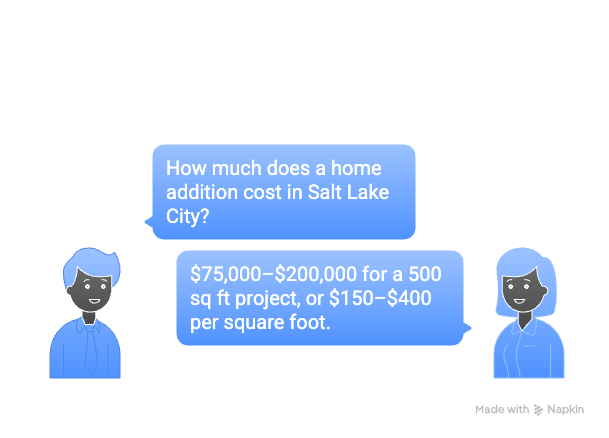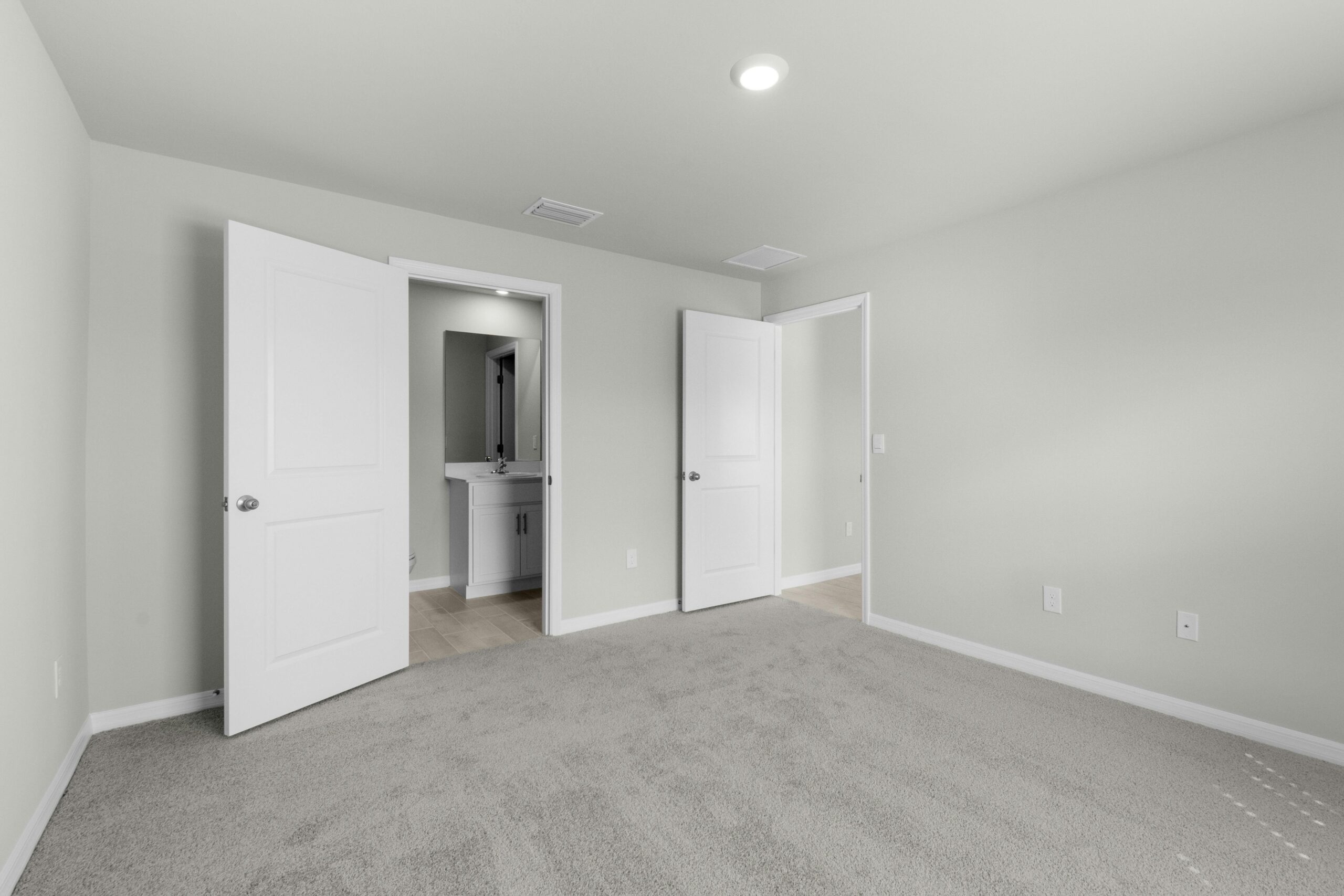Home Addition Cost Salt Lake City: Budget Breakdown & 2026 Pricing
Home addition costs in Salt Lake City range from $75,000–$200,000 for a 500 sq ft project, depending on materials, labor, permits, and complexity. Most additions cost $150–$400 per square foot.
Calculate Your Home Addition Cost
KEY TAKEAWAYS
Q: What’s the average home addition cost in Salt Lake City? Home additions in Salt Lake City typically range from $150–$400 per square foot, depending on materials, complexity, and permits. A 500 sq ft addition costs $75,000–$200,000 on average.
Q: What factors drive the cost of a home addition? Labor costs, material quality (framing, roofing, siding), site conditions, permits and inspections, foundation work, and design complexity all significantly impact your final price.
Q: How can I keep my addition budget realistic? Get multiple quotes from licensed contractors, plan for a 15–20% contingency buffer, prioritize structural elements over finishes, and work with contractors who communicate transparently about costs.
Q: Should I hire a large firm or a local contractor? Local, licensed contractors often deliver better value, personal attention, and quality craftsmanship. General Contractors SLC partners with trusted local professionals who treat your home like their own.
Q: What permits and inspections do I need in Salt Lake City? Salt Lake City requires building permits, electrical inspections, plumbing inspections, and structural inspections. Budget $2,000–$5,000 for all permits and fees. Your contractor should handle this process.
Q: What’s the ROI on a home addition? Most homeowners recoup 50–80% of addition costs when selling. Master bedrooms and bathrooms offer the best ROI. Focus on quality and resale appeal to maximize return.
QUICK ANSWER
Home addition costs in Salt Lake City range from $75,000–$200,000 for a 500 sq ft project, depending on materials, labor, permits, and complexity. Most additions cost $150–$400 per square foot.

WHY HOME ADDITION COSTS $150–$400 PER SQUARE FOOT IN SALT LAKE CITY
The average home addition cost in Salt Lake City reflects Utah’s labor rates, local building code requirements, material availability, and site conditions. Unlike national averages, Salt Lake City pricing is tied to the local construction market’s unique factors—including seasonal weather, skilled labor availability, and strict compliance with Salt Lake City building codes.
Labor Costs: The Largest Factor
Labor typically accounts for 40–50% of your addition cost. In the Salt Lake City metro area, skilled tradespeople (carpenters, electricians, plumbers) charge $50–$85 per hour, depending on experience and specialization. A typical 500 sq ft addition requires 1,000–1,500 labor hours, translating to $50,000–$127,500 in labor alone.
Material Costs in Salt Lake City
Materials account for 35–45% of project costs. Salt Lake City contractors source materials from local suppliers like Ace Hardware, Home Depot, and specialty distributors. Local pricing for framing lumber, drywall, roofing, and siding is competitive but subject to supply chain availability.
Seasonal Factors & Weather
Utah’s mountain climate affects scheduling and material costs. Winter weather (October–March) can slow work, while spring and summer offer faster completion. Some materials (concrete, asphalt) have seasonal price fluctuations. Budget accordingly or plan construction during warmer months.
HOME ADDITION COST BREAKDOWN: WHAT YOU’LL ACTUALLY PAY
Here’s a transparent breakdown of typical costs for a 500 sq ft home addition in Salt Lake City:
| Cost Category | Percentage | 500 sq ft Addition | Notes |
|---|---|---|---|
| Labor (framing, electrical, plumbing, HVAC) | 45% | $67,500 | Largest cost; quality labor ensures durability |
| Materials (lumber, drywall, insulation, roofing) | 30% | $45,000 | Varies by quality; premium finishes increase cost |
| Foundation & Site Prep | 8% | $12,000 | Depends on soil conditions and grading |
| Permits, Inspections & Fees | 5% | $7,500 | Required by Salt Lake City; non-negotiable |
| HVAC, Electrical, Plumbing Integration | 7% | $10,500 | Connecting to existing systems adds complexity |
| Contingency Buffer (15%) | 5% | $7,500 | Always budget for surprises; prevents overruns |
Total Estimated Cost for 500 sq ft Addition: $150,000
WHAT DRIVES HOME ADDITION COSTS UP (OR DOWN) IN SALT LAKE CITY
High-Cost Factors
- Difficult Site Conditions: Sloped lots, rocky soil, or poor drainage require additional foundation work, increasing costs by 20–40%.
- Complex Rooflines: Adding a second story or matching existing roof pitch costs more than single-story, simple additions.
- Premium Finishes: High-end materials like granite countertops, hardwood flooring, or custom cabinetry add $50–$150 per sq ft.
- Utility Relocation: Moving electrical lines, gas lines, or plumbing can add $5,000–$15,000.
- Code Compliance Challenges: Older homes often need structural upgrades or electrical panel replacements to meet current Salt Lake City building codes.
- Winter Construction: Heating tents, weatherproofing, and delays can add 10–20% to labor costs.
Cost-Saving Opportunities
- Simple Design: Single-story, rectangular additions with standard roof lines are cheaper than complex designs.
- Minimal HVAC Integration: Smaller additions requiring less ductwork and fewer vents save $3,000–$8,000.
- Standard Materials: Choosing builder-grade materials over premium options saves 15–25% without sacrificing quality.
- Local Contractors: Small, licensed contractors often have lower overhead and can offer better pricing than large firms.
- Timing: Spring/summer construction avoids winter premiums and weather delays.
- Phased Approach: Building the shell first and finishing interiors later spreads costs and allows budget adjustments.

WHERE TO INVEST VS. WHERE TO SAVE ON YOUR ADDITION
Spend More On:
- Foundation & Structural Work: Quality foundation work prevents future settling, cracking, and costly repairs. Don’t cut corners here.
- Roofing & Weatherproofing: A quality roof (30-year shingles or metal) protects your investment for decades. Poor roofing leads to water damage and mold.
- Labor & Skilled Trades: Hire experienced electricians, plumbers, and HVAC specialists. Quality work prevents callbacks and future problems.
- Insulation & Energy Efficiency: Proper insulation reduces utility bills and increases comfort. It’s cost-effective long-term.
- Windows & Doors: Quality, energy-efficient windows and doors reduce heating/cooling costs and improve curb appeal.
Save Money On:
- Interior Finishes: Paint, trim, and fixtures can be upgraded later if needed. Builder-grade options work fine initially.
- Appliances: Stainless steel appliances are nice but optional. Choose mid-range brands that are reliable and stylish.
- Flooring Options: Laminate or vinyl plank flooring are durable and affordable alternatives to hardwood or tile.
- Kitchen/Bathroom Fixtures: Mid-range faucets and fixtures perform as well as luxury brands at a fraction of the cost.
- Decorative Elements: Backsplash, lighting, and accent walls can be customized later as your budget allows.
STEP-BY-STEP HOME ADDITION PROCESS IN SALT LAKE CITY
Step 1: Define Your Vision & Budget Decide on the addition size, purpose (bedroom, bathroom, living space), and budget range. This guides your entire project. Work with a designer or contractor to develop initial sketches and feasibility.
Step 2: Get Multiple Quotes from Licensed Contractors Reach out to 3–5 licensed, insured contractors in Salt Lake City. Request detailed written estimates that break down labor, materials, permits, and timeline. Compare apples to apples: same scope, materials, and assumptions.
Step 3: Hire the Right Contractor (Not the Cheapest) Choose a contractor with solid references, proper licensing, insurance, and clear communication. A trusted local contractor like those in our network delivers better value, quality, and peace of mind than a discount provider.
Step 4: Obtain Building Permits & Inspections Your contractor should handle permit applications with the City and County Building Department. Expect 2–4 weeks for approval. Budget $2,000–$5,000 for permits and inspections. This protects your investment and ensures code compliance.
Step 5: Plan Utilities & Infrastructure Work with licensed electricians and plumbers to plan electrical panels, circuits, gas lines, water lines, and HVAC integration. Coordinate with your main contractor to ensure seamless connection to existing systems.
Step 6: Site Preparation & Foundation Clear and grade the site, set up a work zone, and prepare the foundation. This typically takes 1–2 weeks. Proper preparation prevents delays and cost overruns later.
Step 7: Framing, Roofing & Weather Envelope Once the foundation is ready, framing begins (2–4 weeks). After framing, the roof is installed to weatherproof the structure. This is critical—a leaky roof leads to damage and mold.
Step 8: Electrical, Plumbing & HVAC Installation Rough-in work (pipes, wiring, ductwork) happens after framing. Inspections follow each trade. This phase typically takes 2–4 weeks depending on complexity.
Step 9: Insulation, Drywall & Interior Finishes Insulation is installed, followed by drywall. Once drywall is finished, painting, flooring, trim, and fixture installation begin. This phase takes 4–6 weeks.
Step 10: Final Inspections & Walkthrough The city conducts final inspections (electrical, plumbing, building). You and your contractor do a detailed walkthrough, identify any punch-list items, and ensure everything meets expectations before final payment.
Total Timeline: Most home additions take 12–18 weeks from permit approval to completion, depending on size and complexity. Winter weather can add 2–4 weeks.
HOME ADDITION ROI: WHY THIS INVESTMENT MATTERS FOR YOUR FUTURE
A well-executed home addition isn’t just about immediate comfort—it’s a strategic investment in your home’s value and your family’s quality of life.
Return on Investment (ROI)
Most homeowners recoup 50–80% of their addition cost when selling. Here’s how it breaks down:
- Master Bedroom Addition: 60–75% ROI. Buyers highly value additional bedrooms.
- Bathroom Addition: 65–80% ROI. Extra bathrooms are a top buyer priority.
- Kitchen Expansion: 55–70% ROI. Updated kitchens drive buyer interest.
- Living Space/Family Room: 50–65% ROI. Versatile spaces appeal to families.
- Home Office: 50–60% ROI. Post-pandemic, home offices are valuable.
Beyond Resale: Lifestyle & Long-Term Value
- Immediate Quality of Life: An extra bedroom eliminates overcrowding. A new bathroom reduces morning conflicts. A larger living space creates room for family activities and gatherings.
- Aging in Place: Adding a main-floor bedroom or bathroom lets homeowners age comfortably at home rather than moving to assisted living.
- Home Office Space: A dedicated, quiet workspace increases productivity and professional image—valuable whether you’re working from home or need a creative retreat.
- Property Tax Considerations: Salt Lake City assesses property values based on square footage and improvements. A larger home may increase taxes, but the lifestyle and resale gains justify the investment for most homeowners.
Why Working with Honest, Local Contractors Protects Your ROI
Large construction firms often prioritize speed and profit margins over quality. They subcontract work to multiple parties, reducing accountability. Local contractors, by contrast, are invested in their community reputation. They hire skilled, experienced tradespeople, source quality materials, and stay on-site to ensure excellence. This commitment to craftsmanship protects your investment and maximizes ROI.
READY TO START YOUR HOME ADDITION?
Get connected with a trusted, licensed contractor in Salt Lake City who shares our values of quality, honesty, and personal service.

